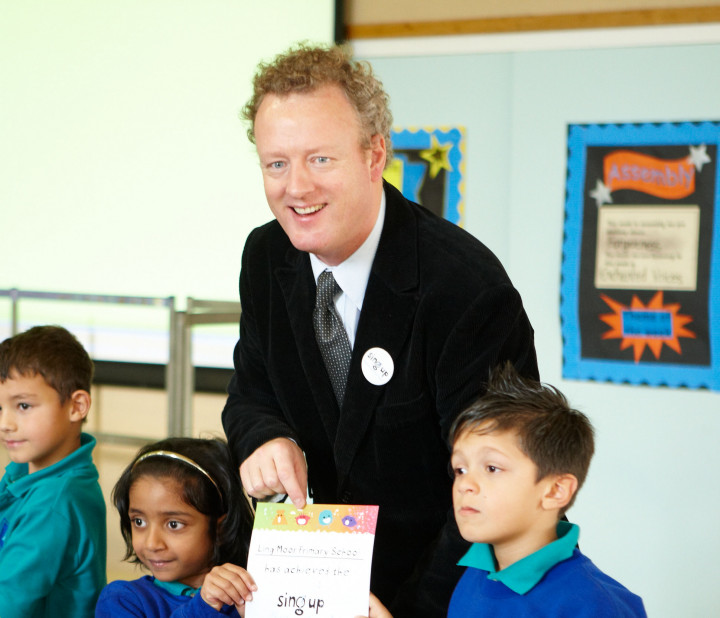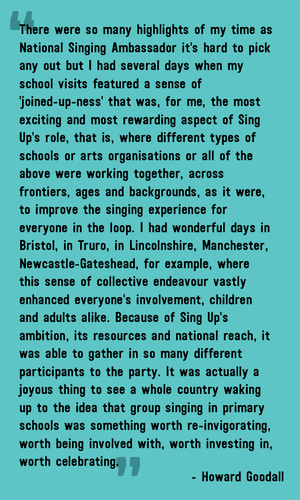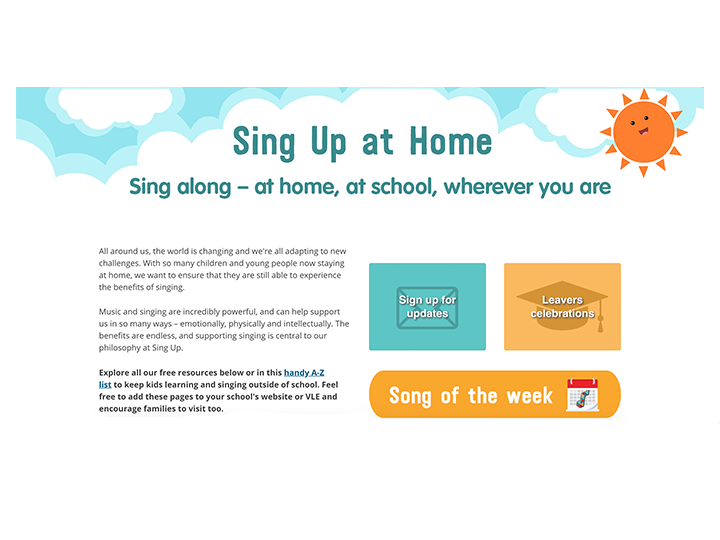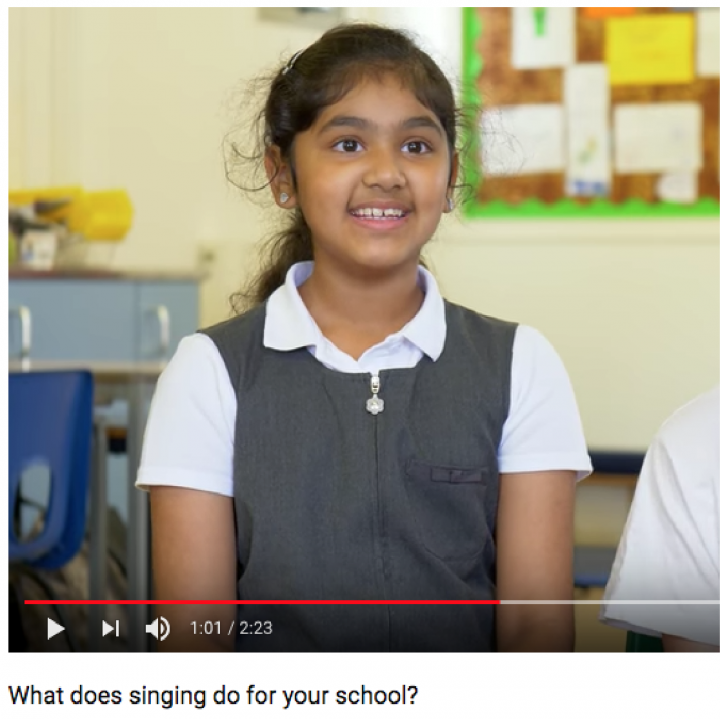
Michelle: As National Singing Ambassador, you were heavily involved in the work that led up to the creation of Sing Up in 2007 – the government’s Music Manifesto and the work we did together on the National Singing Programme from 2007 – 2012; from your perspective, what are the main changes that have happened recently and what’s your take on the current state of play in music education?
Howard: One of the things that I have noticed most is that you can’t get very far in a school without seeing the impact of government policy. And it’s not just the arts, it’s a profound change of focus away from creativity.
In the context of music, this is leading to fewer pupils choosing to do music at GCSE resulting in fewer teachers in school to teach music. And you can’t have extracurricular music activities without a teacher being there. You need people on site that have skills, a passion and a drive. The tendency when school budgets are pressed, is to dump the music and spend it on something else. Why?
The positive effect of the arts in education is something that in the nineteenth century no one would have questioned. It was understood that if you wanted to innovate the arts and sciences were allied.
Michelle: And what about our young people’s mental well-being? We are putting them under immense pressure to get the best grades and ironically, part of what might help young people cope is remaining involved in music-making. Singing can’t solve everything, but we know there is something about singing in a group that can build insulation around our young people; boosting their resilience and self-esteem.
Howard: The connection between music and well-being is moving out of the anecdotal to the scientific realm. We should be looking at the benefits singing can provide alongside the fact that mental health issues among young people is an increasing problem, for which we are relatively unprepared. It’s easy enough to uncover the issue, it’s much harder to find solutions.
All of us feel that participation in musical activities could be something of immense value.
Michelle: So if the question isn’t whether or not music is a good thing for our young people – it clearly is – what should be music’s position in schools?
Howard: There’s a danger that current policy is pushing us towards a continental model: in Europe music is mostly done outside of school time in separate facilities – the provisions for which, we as a country, don’t have in place. We are already geared-up to have music happen in schools. It would be much more expensive to rebuild that infrastructure somewhere else. Then the question comes back to head teachers: what do they want? I feel that head teachers can be the ones to make music live or die. Luckily most heads don’t want to lose music within their schools, but they must stand up and make a case for it.
There is something inherently illogical that music should be side-lined. We’re really good at music as a nation. It is one of our biggest exports. We’re the second biggest provider of music in the world with the music sector contributing £4.4 billion a year to the UK economy – I know it’s not all about the money, but nor can we avoid the issue: If we were one of the biggest exporters of tropical fruit in the world, we would think it weird not to learn anything about cultivating fruit at school – so why is the same not said about music? Even if we want to match other countries in other subject areas, we shouldn’t let music be passed by.
Michelle: Is there a notion that the top musicians will just rise out of the ether anyway – because of the idea of talent being a ‘gift’? And what about working hard at something in order to become accomplished? Do you think that ethos is becoming lost?
Howard: I believe this in part comes from reality shows, where music is often shown as an individualistic activity whereas, being a musician is largely about being a team player. Reality shows portray that it’s about becoming celebrated, twinned with the feeling that if you’re not prodigal then there’s no point. Parents pick up on the idea that “if my child isn’t Lang Lang, it’s not worth it” but people in the music industry wouldn’t agree with this – including Lang Lang!
Music asks, can you stick at it and apply yourself? Can you realise that in any field of endeavour there will be hard times? You can’t be good at anything without application. You can’t be the next Bradley Wiggins by doing a bit of cycling once a week for a bit.
Michelle: So if we invest more in music education there will be more gains. At the other end of the spectrum, if we continue the trajectory we’re currently on where music is sidelined what alarm bells should we be looking out for?
Howard: Don’t we now find ourselves to be a very disunited nation? There’s a lot of anger and frustration and the generational gap is perhaps the biggest in my lifetime.
The speed at which we’ve unravelled from 2012 is extreme. The factors that have led to this are very complex but our school communities are a microcosm of our future society. The people that will get us out of this will be the current younger generations.
Singing and playing music in groups is a very healing, non-competitive thing to do in schools. When something toxic happens to us, what do we naturally respond with? Take the Manchester bombing as an example – one of our first responses is to make music together. That isn’t accidental.




